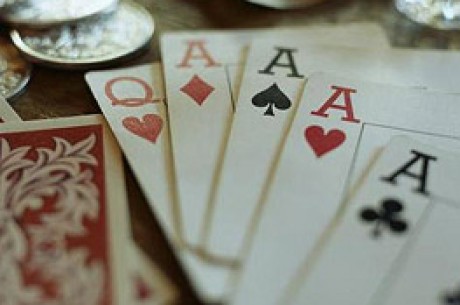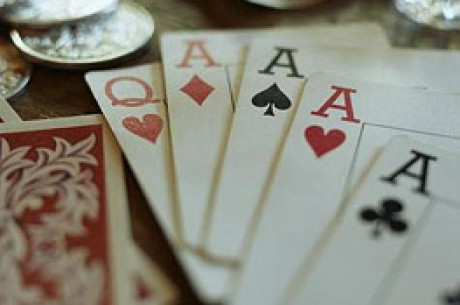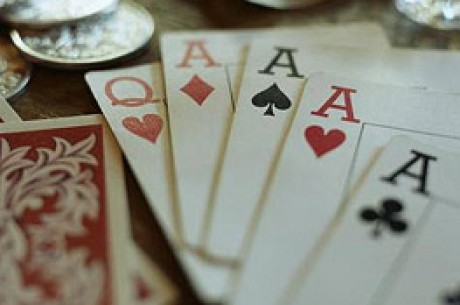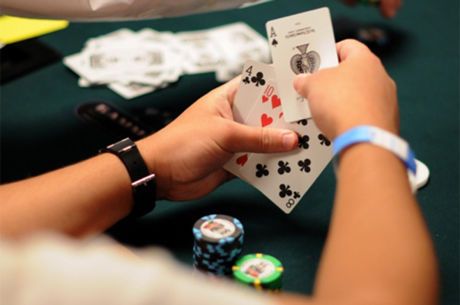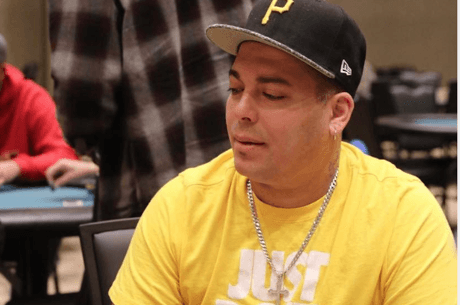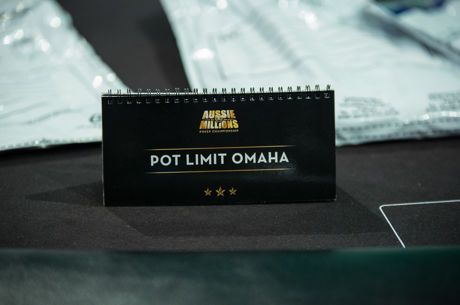Introduction to Omaha Part IX - Hands to Avoid in Hi/Lo Split
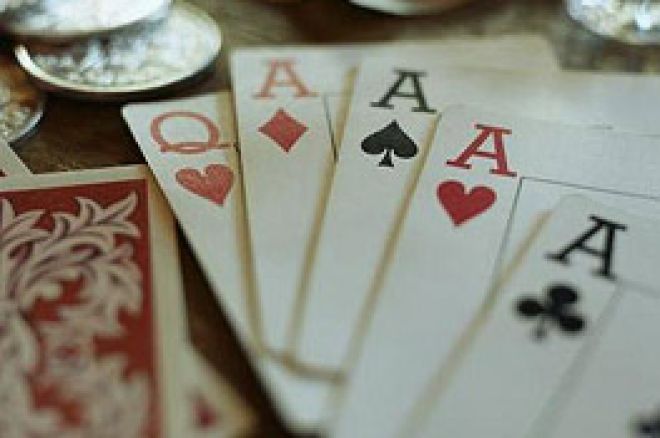
Tony is a regular on-line player living in England. He mostly plays Texas Hold'em and Omaha (High and Split) at fixed, pot and no limit, at both cash and tournament tables. Tony says: "I often play lower stakes games because there is money to be made without excessive risk to your bankroll. Many players I come up against at these levels are not schooled in poker strategy and the truth is they are giving away money, either through ignorance of strategy or misplaced aggression. If you have a limited bankroll, you should be conservative and choosy but the pickings are there. These articles are written to prevent you becoming one of the hunted."
Introduction
In Article III of this series, I discussed the basic differences between Omaha High and Omaha Hi/Lo Split. I emphasised that the Split game introduces the concept of two half-pots and how you should only enter a pot if you have a reasonable chance at the outset of taking both halves of the pot or the whole pot if no low hand qualifies ("scooping the pot").
In Article IV of this series, I spent more time analysing the low hand and its peculiarities, including the ease in which players can lose value by over-betting hands that contain only mediocre low hands or counterfeited low cards.
The remainder of the articles have concentrated on defining the many ways in which a high hand can be formed and played and how the hand values interact in the game of Omaha. The basic high hand is valid in both Omaha High and Omaha Hi/Lo Split so the next question to consider is whether there are any high hands that should be played differently in Omaha Hi/Lo Split compared to Omaha High.
The answer is yes and this article takes an initial look at a key area.
A Quick Recap
As the term "Hi/Lo" implies, you are seeking to make both a high hand and a low hand. You can do this by using any of the two-card combinations from your four hole cards to create two different hands with any three of the five community cards.
Here is an example:
Hole cards: Ad Kc 3d 2c
Community cards: 4c Kd 8h Kh 2s
For the high hand, the player uses Kc 2c from the hole and Kd Kh 2s from the board to make a full house. For the low hand, he uses Ad 3d from the hole and 4c 8h 2s from the board to make an 8-high low hand. All nine cards have been used to make the two hands and the starting hole cards contained strong high cards (AK) to accompany the strong low cards (A23) with the Ace combining to good effect. The important aspect is the strength at both ends of the spectrum in the starting hand.
A logical conclusion can be inferred from this. Namely, that the best high hands usually contain very high cards and the best low hands always contain very low cards.
Between A Rock and a Hard Place
In contrast, this would suggest that a starting hand of four hole cards with plenty of middle-ranking cards is not so valuable. As your cards lose height, you start to dip below the clouds into low-hand territory! This is detrimental to your profitability.
Take this example:
Hole cards 9d 8c 7s 6d
In Article VI, I discussed the strength of middle-ranking consecutive cards when playing Omaha High. The above hole cards represent considerable potential in Omaha High because there are many flop combinations that can put you on the way to winning the pot. That is the key - "winning the pot".
In Omaha Hi/Lo Split, the same flop cards that can win you the whole pot in Omaha High, will only win you half the pot. The reason for this is because the flop cards you need will mainly be ranked 8 or lower. In other words, they will help another player holding cards like A2, A3, 23 and even rough cards like 53 take the low pot.
The only way to win the whole of the pot with a high-ranking hand like a 9-high straight where you hold no very low cards yourself is for there to be no qualifying low hand. For that to be true, there can only be two unique cards of 8 or less on the board, implying there will be many high cards on the board and/or paired cards. This in turn threatens your 9-high straight because there will be so many draws for a higher straight or a full house.
Here is an example of some community cards to go with the hole cards above.
Community cards: Td 7h 6s Kd Jc
If you decided to bet and see a flop, you would be mildly pleased from a high-hand perspective at the result. You have made the temporary nut straight, T-high. You also have a 2-pair, 7766T. If another of the remaining two 6's or 7's hit the turn or river, you would have a full house, albeit not the nuts.
However, there are two low cards, a 7 and a 6, on the flop. Anyone holding A2, A3 and maybe A4 or 23 would be likely to stay in the pot hoping to see a low card like an 8, 5, 4, 3, 2 or A on the turn or river.
You, meanwhile, want to avoid seeing these cards on the turn or river as they will deprive you of half the pot. You also must fear two high cards that will open up the possibility of higher straights to your opponents. To avoid a qualifying low hand requires both final cards to be from the values 9, T, J, Q or K (not A because that is also a low card). Alternatively, a 7 or a 2 will pair the board and not count toward the low hands but it will open up full house possibilities to the detriment of your straight.
In the above example, a K and a J has arrived to complete the board. There is no qualifying low hand but your best hand is a J-high straight. Anyone holding AQ or Q9 has you beat. On the other hand, had one or two low cards arrived, you would have lost half the pot to a low hand even had your straight stood up.
Betting out with hands like 9876, T987, J988 and 7765 in Omaha Hi/Lo Split will leave you between a rock and a hard place where your maximum expectation is winning half a pot. This goes against the principle of gunning for the whole pot which is your sensible aim if you are to derive maximum profit from Omaha Hi/Lo Split.
Rules of Thumb for your Hands
Hands like those described above can be quality starting hands in Omaha High but not in Omaha Hi/Lo Split. I have even had it said to me by an experienced on-line poker player that any starting hands in Omaha Hi/Lo Split that contain a single 9 should be mucked forthwith. The reason is because a 9 is the lowest high card that does not qualify for inclusion in a low hand. Consequently, with a 9 in your hole cards, you are only using a maximum of three useful cards and that is itself often a good reason to fold unless you have premium cards like AA2 to go with it.
Folding any 9 is a rule of thumb that can at least act as a guide in your decision-making and instil discipline, especially in a tournament where a wrong decision to play a marginal hand may cost you your seat!
Another rule considered by many a professional is that if you have no premium low cards (generally AA2, AA3, A23, A24, etc), you should only enter a pot if you have an exclusively strong high hand featuring all four cards. Such hands are the premium Omaha high hands like AAKK, AAKQ, KKQJ, KQJT, and so on. You must reinforce within yourself the notion that these hands will all stand a good chance of hitting nut hands in the event that the board cards show at least three cards of 9 and above, thus precluding a qualifying low hand.
As always, the careful player is seeking to scoop the pot either by taking the whole pot with the high hand (no qualifying low hand having been made), or by having the nut low hand and a good chance of the high hand too. This is achieved only by having cards like AA23, AAK2, A234.
Conclusion
The existence of two half-pots in Omaha Hi/Lo Split complicates the judgement of value. Suddenly, a quality high hand with middle-ranking cards is dripping with potential liabilities. Taking only half the pot is not the way to make money fast at Omaha Hi/Lo Split. So many players enter pots with only that expectation but that at least helps bolster the size of the pot when you finally wade in with a monster and scoop the lot.
If you didn't already know, Omaha Hi/Lo Split is a waiting game, to be played in a tight fashion, so don't get caught in No-Man's Land with a collection of middling cards!
Exorcism
1 June 2005
Ed Note: Excellent Omaha games at Ultimate Bet at all limits

